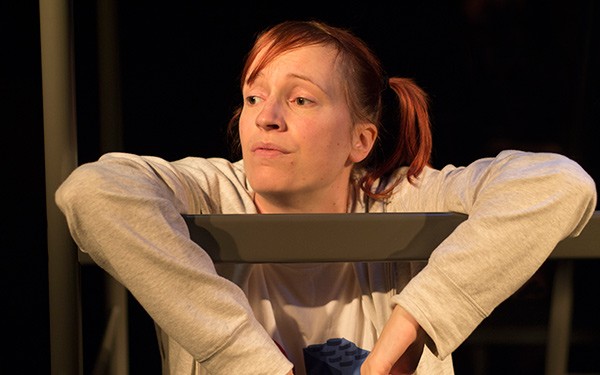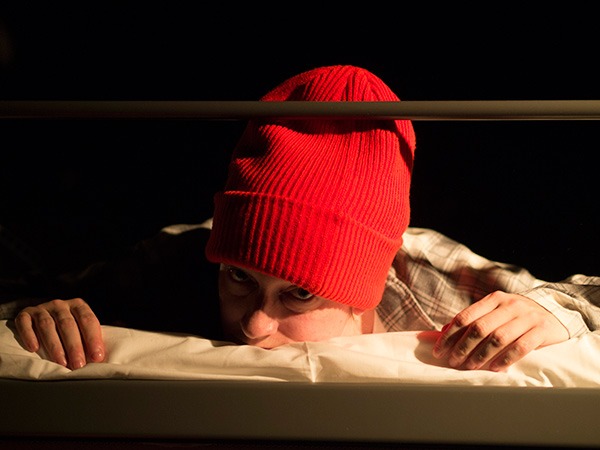A play about an 8-year old autistic girl dying from cancer sounds like a recipe for a melancholy night out, but Spoonface Steinberg is actually entirely the opposite: uplifting, clarifying and hopeful.
Peel The Limelight have never been a production company to shy away from difficult topics and unusual plays (see last year’s How I Learned To Drive as a prime example) and Spoonface Steinberg, presented as part of the 2017 Bangkok Theatre Festival, is yet another gem in their repertoire.
Written by Lee Hall — who would later go on to write Billy Elliot — Spoonface Steinberg is about a young girl with autism who is eventually diagnosed with an incurable cancer that she will most certainly die from.
Nicknamed Spoonface for her perfectly round face, she narrates the entire play as a monologue from her bedroom, telling the audience all about her special brain, her aptitude with ‘the numbers and the dates’, and filling us all in on the story of her 8 years in this world.
Spoonface is first and foremost an observer. Through her eyes and voice, we learn about the struggles of her young parents as they deal first with her condition and later her disease.
Her father’s affairs and her mother’s attachment to the vodka bottle are told completely matter-of-fact, without commentary from Spoonface, and she tells us often of how people cry around her and about her — whether it’s her mother lamenting the fact that she’s a ‘poor girl’, her father’s late night crisis, her doctor, or even the cleaner, Mrs Spud.
No crying for Spoonface though. While she has moments of fear and upset — the prospect of being zapped during radiotherapy and going in ‘the tube’ at the hospital — she never indulges in self pity or reflection. She’s an incredibly likeable character and easy to watch for the duration of the play: honest, disarmingly naive, funny and thought-provoking.

The hour-long monologue is so dense and so perfectly acted here that we get a full picture of Spoonface’s life and the lives of those around her — even though it’s just her, in this one small room.
She isn’t only telling her story in Spoonface Steinberg: interspersed throughout are her musings on the opera she loves so much, the divas that sing it, and her thoughts on more existential topics: the Holocaust, religion and, inevitably, her own death.
The fact that this is Spoonface’s inner monologue — rather than just a naturalistic play following Spoonface and her family — adds a huge amount of pathos and emotional depth. Considering the running time is only around an hour, it packs just as much of a punch as a play double in length.
Much of this is down to the very skilled performance of Claire Stanley as Spoonface, who fully embodies the character both physically and vocally. Her gentle northern English accent is the perfect canvas for Spoonface’s narrative, which manages to one minute deliver charmingly funny observations on the outside world with some really quite devastating truths on the human condition the next.
‘Out of the mouths of babes…’ people say, and this is certainly true with Spoonface. She is all front and honesty — what you see is what you get. It’s refreshing to see topics that are normally shied away from by adults be tackled so earnestly by a child.
Physically too, Stanley is utterly believable as an 8-year old girl with autism. From her child-like scrambling around the bed, careful arrangement of her blanket and almost absentminded cataloguing of her legos by colour, the character is never overplayed or caricatured.
One of the greatest strengths of the script and Stanley’s acting is that being autistic is treated not as a tragedy by Spoonface, but simply as a an example of our human differences. Having a ‘special brain’ is how she understands why her brain works differently to others, and why she’s so good at numbers when Mrs Spud, for instance, is so good at cleaning toilets. People are different.
There’s a clear distinction made between her autism and her cancer. The autism isn’t why she’s sick — in fact, that’s practically irrelevant. It’s just part of who she is. Her cancer has made her sick.

Towards the end of the play, Spoonface talks more candidly about the fact of her imminent death and the concept of what comes at the end.
Once again, we see her tackling truths that many adults daren’t uncover: why are we scared of nothingness after death when there was only nothingness before we were born? ‘Death is less than nothing,’ she concludes, again in that charming matter-of-fact manner of hers.
This purity and clarity is both confronting and incredibly uplifting. Spoonface is ultimately a figure of hope for humanity — even when everyone around her is crumbling.
At the start of play, we see Spoonface wishing that she could die like the heroines of opera do: singing their last refrain in their final breaths, thus preserving a little piece of beauty in the world as they leave it. I hope Spoonface realises that in leaving the world with this monologue, she too is leaving a piece of beauty as she dies.
Spoonface Steinberg by Peel The Limelight is a touching, humanizing and ultimately inspiring performance that we would urge Bangkokians to see before it closes.
Will there be a tear in your eye for the wonderful Spoonface by the end? We’d bet good money on it.
- Dates: November 9-19 (no shows on Monday 13, Tuesday 14 or Wednesday 15)
- Time: 7.30pm (60 minutes run time)
- Venue: Spark Drama on the 2nd floor of Jasmine City Building, on the corner of Sukhumvit Road with Soi 23
- Public Transport: 5 minute walk from BTS Asoke and MRT Sukhumvit
- Price: 600 THB adults, 500 THB students (discount for groups of 10 or more)
- Buy tickets at peelthelimelight.com
Have you seen Spoonface Steinberg yet?
Photos courtesy of Peel The Limelight


